You’ve heard it said time and time again that breakfast is the most important meal of the day. But how much breakfast should you eat when you’re hoping to lose weight? We spoke with The Nutrition Twins®, Tammy Lakatos Shames, RD, CDN, CFT, and Lyssie Lakatos, RD, CDN, CFT, members of our Medical Expert Board, who break down how many calories to eat for breakfast when your goal is to lose weight.
If you’re counting calories, every one you consume needs to be considered. As far as breakfast is concerned, this meal sets the tone for your entire day. It has the potential to boost or drain your energy, and you have to be careful to not spend all of your calories on one particular meal. It can be a very long day when you are dieting. But don’t fret, because The Nutrition Twins spill the breakfast tea on exactly how many calories your breakfast should be to support your weight loss journey. Read on to learn more, and when you’re done, be sure to check out 9 Lazy Ways to Lose Weight All Month Long.
How many calories do you need to eat for breakfast to lose weight?
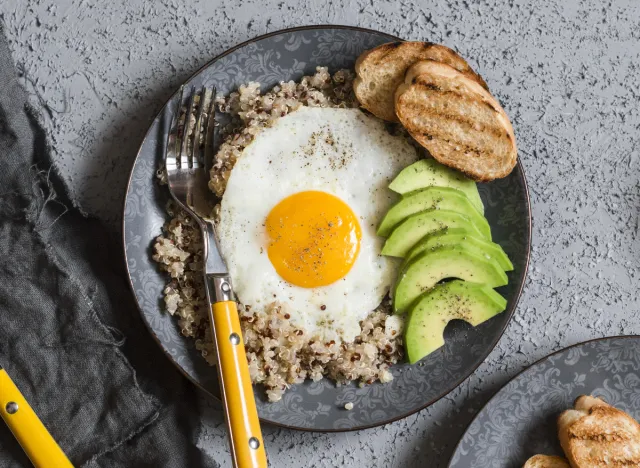
Typically, a diet limits you to a certain number of calories for an entire day. However, The Nutrition Twins suggest females should keep their first meal of the day—and every meal after—to under 400 calories to establish a calorie deficit. “This allows for a couple hundred calories to be added during snacks, yet to still be at about 1,500 calories,” they explain.
As far as males and active females are concerned, they can consume a couple hundred calories more during the day—around 450 to 500 for breakfast. They do caution, though, to be mindful of what those calories consist of. “Perhaps just as important, if not more crucial than the calories themselves are what components are in the calories,” The Nutrition Twins stress. “For instance, 400 calories of carbohydrates without protein would be disastrous for the waistline, spiking blood sugar and then causing a crash, promoting hunger and low energy and likely overeating soon after.”
Here are the best breakfast tips to live by for weight loss.
1. Increase your protein intake.
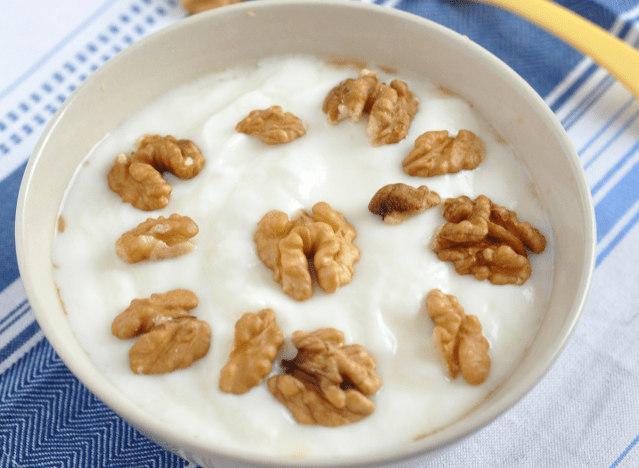
The Nutrition Twins recommend consuming a minimum of 20 grams of protein for breakfast. They share, “Protein causes a steady and gradual digestion and will help to keep you satisfied, as well as stabilize blood sugar. It prevents energy crashes that trigger sugar cravings that kick in when the brain and body crave a quick pick-me-up for fuel. Energy crashes also trigger neurotransmitters including the belly fat hormone, cortisol.”
Your best bets when it comes to protein choices that keep the calories in check include egg whites, eggs, protein powder, and Greek yogurt. By simply consuming 20 grams of any of these foods, along with following additional key components of a healthy weight-loss breakfast, you’ll keep your breakfast count within the 400-calorie goal.
2. Combine high-fiber foods with your protein.
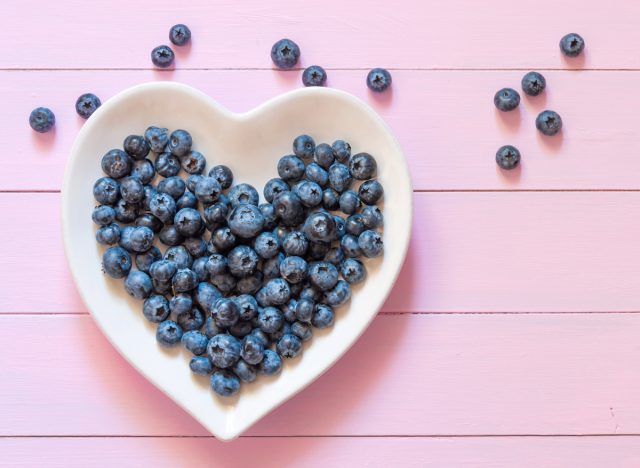
The marriage of high-fiber foods and protein is a happy one. Foods that contain a lot of fiber are chock-full of nutrients without too many calories. Good examples are low-glycemic, antioxidant-rich fruits such as veggies and berries, and ½-cup portions of whole grains. Similar to protein, fiber takes its time to digest. This is a good thing, as it provides you with energy that lasts long, keeping you full throughout the morning.
“Fiber swells in your stomach when you drink water, taking up space, helping to fill you up and prevent hunger, while also stabilizing blood sugar,” The Nutrition Twins explain. “Fiber keeps you regular which becomes even more important during weight loss, as toxins that have been stored in the fat cells are released and need to be excreted. Aim for at least five grams, but ideally more.”
3. Add healthy fats to your diet.
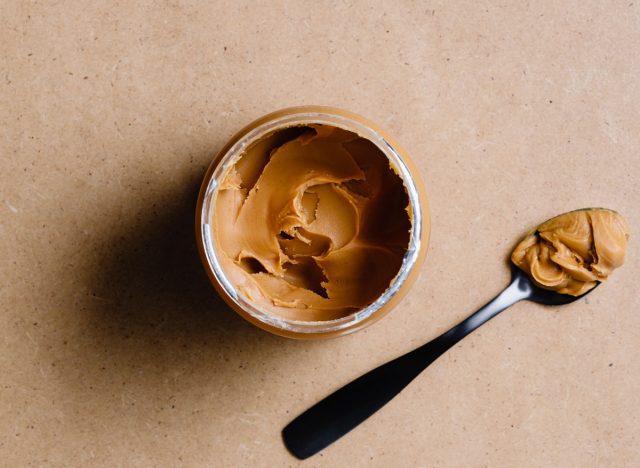
Healthy fats are stellar in fighting inflammation. This is key for losing weight, as inflammation makes the process more challenging. “A fat source will boost the absorption of fat-soluble vitamins, like vitamins A, D, and E that are necessary to keep the body healthy and mop up free radicals that cause inflammation,” The Nutrition Twins say. “Choosing a healthy fat is the key, compared to an artery-clogging fat that will create inflammation. Fat provides satiety as well, which plays a critical role in weight loss and preventing overeating. About 100-150 calories worth of healthy fat will do the trick!”
Two excellent choices are peanuts and peanut butter. They are quite satisfying and will help support healthy weight management because of the good unsaturated fats they give you. “Peanut butter and peanuts also provide seven grams of plant-based protein that offer affordable and accessible nutrition throughout every stage of life,” The Nutrition Twins add. “They’re especially great because they are shelf stable and easy to mix into oatmeal, yogurt, a smoothie, or spread peanut butter on an apple or piece of toast.”
In addition, avocados are another great breakfast option that offers healthy fat, aka monounsaturated fat. Combine them with eggs and fruit for a delicious morning meal.
4. Don’t forget about your carbs.
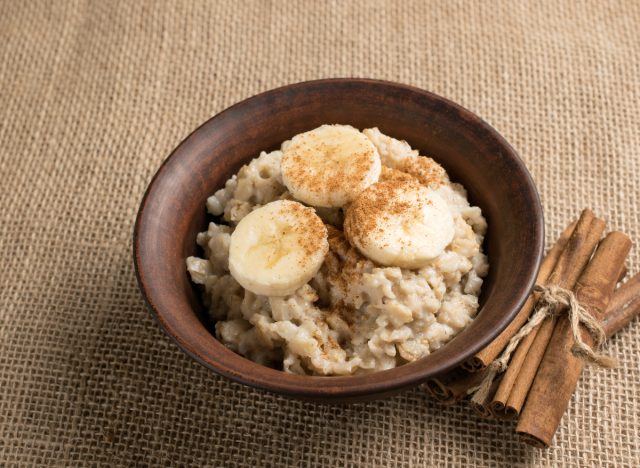
Not all carbs are bad; it’s really all in the choices. The Nutrition Twins encourage you to consume some carbs—even if you’re trying to lose weight. They recommend shopping for whole-grain sprouted bread for toast, such as Ezekiel. A whole-grain cereal like oatmeal is another excellent option to consume after enjoying the protein portion of your breakfast, along with the healthy fat.
“Research shows this will help to prevent blood sugar spikes and crashes, which in turn reduces your sugar cravings since cravings set in when blood sugar drops,” The Nutrition Twins share. “It doesn’t take much—about 80 to 150 calories of a wholesome carbohydrate is enough for most people. Active individuals and larger men may need a little more.”
5. Stay away from added sugar.

Be sure to stay away from added sugar during breakfast—or any part of the day, for that matter. Sugar is inflammatory, which makes losing weight more challenging. In addition, it’s packed with calories and doesn’t offer nutrients. All in all, sugar is not your friend.
“We have our clients do this as sugar causes blood sugar swings that result in energy dips and cravings and typically negatively impacts food choices for the rest of the day,” The Nutrition Twins share. “Natural sugar found in fruit that comes with antioxidants, anti-inflammatory compounds, and fiber is perfectly fine and doesn’t need to be avoided.”
6. Say no to all-carb breakfasts.
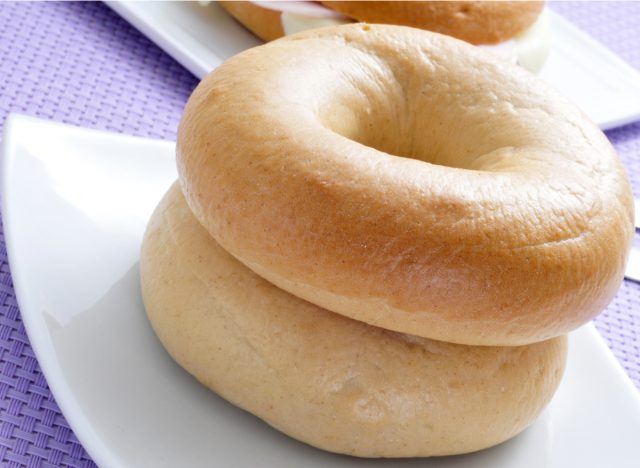
All-carb breakfasts should be avoided at all costs. This includes bagels, muffins, and cereal. “They typically are refined carbs with no fiber and are either just white, doughy carbs or sugary carbs,” The Nutrition Twins explain. “Either way, they’ll spike blood sugar and provide a lot of calories, causing you to crash and leaving you hungry an hour later, causing you to overeat.”

